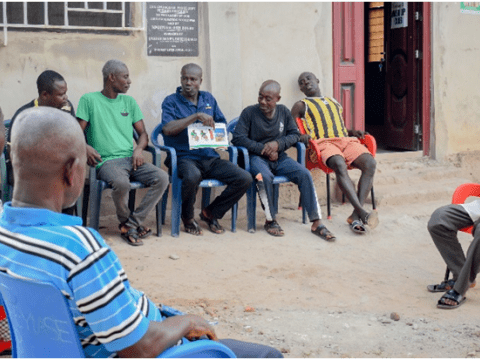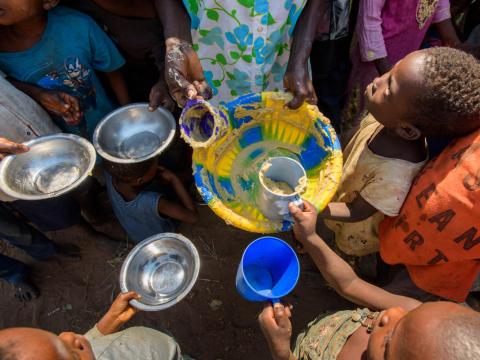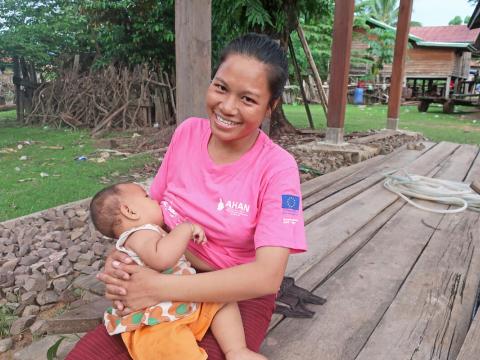
Why breastfeeding is men's work too
Awurabena considers how vital it is for men to understand and support women to breastfeed.
3 August, 2023
Should men have a role in breastfeeding? Absolutely. Do they? Not always. Despite being the gold standard for infant nutrition in the first 1000 days of life, women are too often left to cope and sometimes struggle alone.
Successful breastfeeding requires full support for postpartum women from their whole family, especially from the spouse or significant male partner. Fathers play a crucial role in parenting and caring for children, and their knowledge, attitude, and beliefs can influence a mother’s feeding choices. Empowering men to be champions of breastfeeding promotion in their homes is crucial.
This is why, as part of a World Bank-supported ‘Improved Feeding Practices for the First 1000 Days’ programme, men in Ghana were among a number of groups that received training on the various interventions, including health screening for malnourished children and others suffering from deteriorating health conditions and mother-to-mother support group discussions on child feeding practices such as exclusive breastfeeding.
Similar to the mother-to-mother support group model, World Vision selected 60 men from the local project communities and trained them as “male champions” across the three districts. Once trained, the men led and facilitated the establishment of more formalized groups within communities to support maternal, newborn, and child health and nutrition and sanitation and hygiene interventions.
Two leaders from each group were trained as health volunteers to supplement the efforts of health care providers and gained practical experience on nutrition and health care services.
The groups of men discussed various topics such as breastfeeding, timely and appropriate introduction of complementary feeding, and negative nutrition traditions and practices that should be discontinued. The male champions led the groups of 15 to 25 men in their respective communities, encouraging other men in the community to support their partners during breastfeeding and complementary feeding.
This support included doing the household chores, caring for older children, guaranteeing the well-being of their partner, preparing meals, recognising a newborn's hunger cues, and helping in burping the baby.
One champion, Peter Peprah, welcomed the training and recognised that it made a world of difference to his family, “I can now tell when my baby is hungry and needs to be breastfed, and I can prepare a nutrient-dense porridge to feed my child when my wife is busy.”
The integrated nutrition and agriculture programme ran from September 2020 to August 2023, reaching 5,500 women of reproductive age including pregnant and lactating women and adolescent girls as well as 4,900 children under two years with information, interventions and support. A significant improvement was seen in the quality of health service delivery in all partner health centres and in household feeding practices, resulting in better child growth and birth outcomes.
The integrated project intensified the promotion of exclusive breastfeeding for children to six months, with appropriate complementary feeding, reaching approximately 28,178 families of children under two years with exclusive and appropriate breastfeeding behavioural change communication, and also promoted household farming of local crops to ensure a year-round supply of nutritious foods. In addition, more than 11,000 people were reached with nutrition and child health messages through radio campaigns.
Men's participation in child healthcare, breastfeeding and pregnancy management is a significant change the project achieved.
A men’s group participant, Awuni James, commented: “I left child healthcare to my wife solely previously. That has since changed because of the orientation I received from World Vision. Now I support my wife to manage our children’s health, hygiene and education. I take our child for weighing and I am not ashamed of it any longer.”
At a project closing event in July 2023, Madam Lubabatu Dawuda, the Kintampo South District Health Director and the project’s District Steering Committee Chairperson announced from the first quarter of 2020 to 2023, the district witnessed a remarkable reduction in the percentage of underweight children, decreasing from 3.4 to 0.09 per cent. The percentage of children aged between 12 and 59 months receiving vitamin A supplements increased significantly (from 68.5% to 78.6%), as did the number of pregnant women tested for anaemia. She emphasised that the Health Directorate would continue to collaborate with stakeholders including community groups to sustain the progress achieved in previous years, to continuously improve the nutritional well-being of both children and mothers in the area.
Feedback from the men and mums reinforced how vital it is for fathers and other male family members to give breastfeeding mothers all the help and support they need, which enables them to give their children the very best start in life.
The Improved Feeding Practices for the First 1000 Days project was funded by the Japan Social Development Fund through the World Bank in collaboration with World Vision Japan, World Vision Ghana, University of Ghana, Ghana Ministry of Health, Ghana Health Services, Ministry of Food and Agriculture and Ministry of Finance.
To learn more about the programme visit here and here, and to learn more about World Vision’s approach to breastfeeding click here
Awurabena Quayeba Dadzie, is Health & Nutrition Technical Manager, World Vision Ghana


